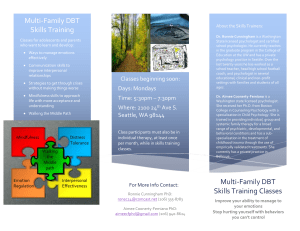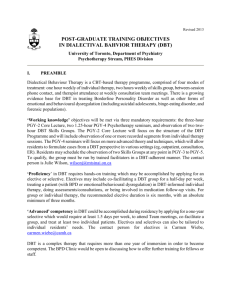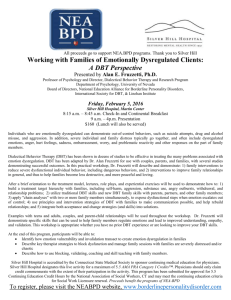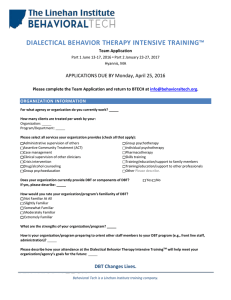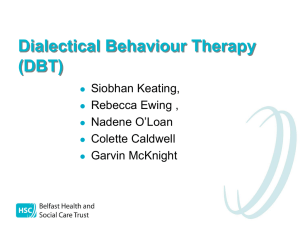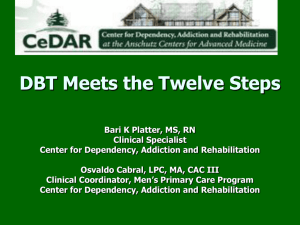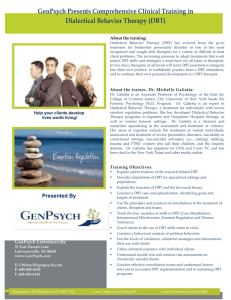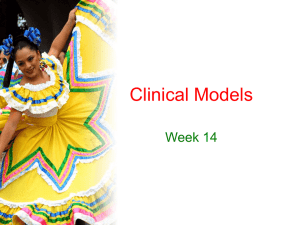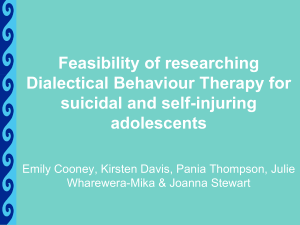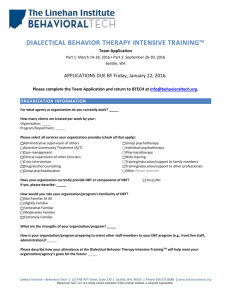Mayo DBT Programme Information leaflet
advertisement
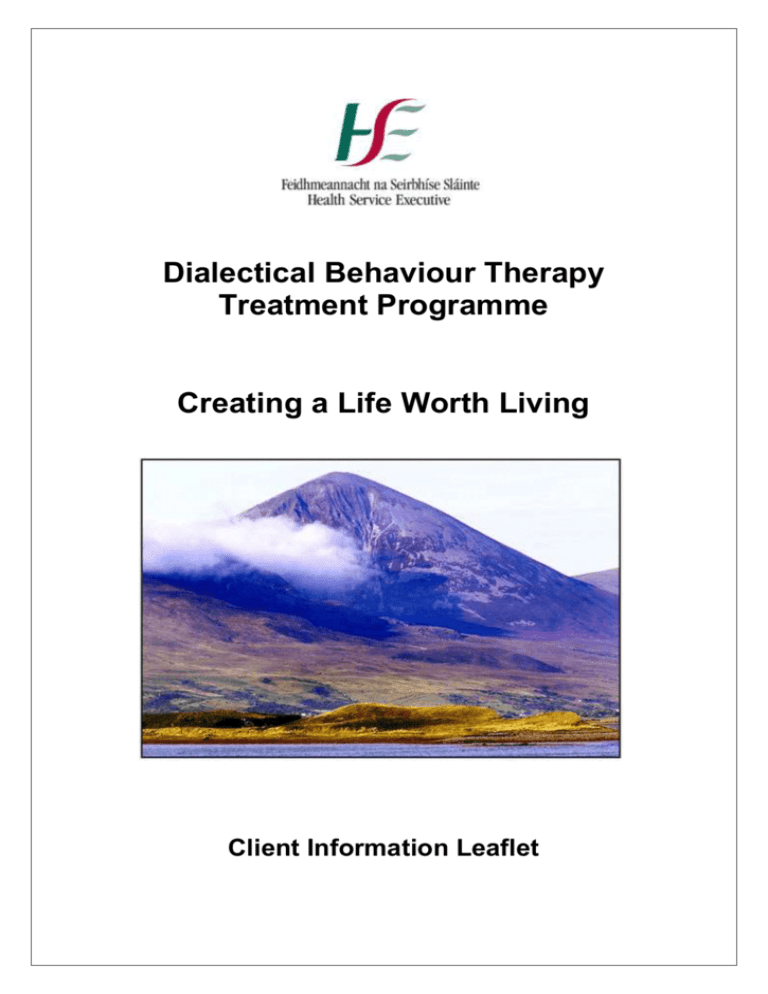
Dialectical Behaviour Therapy Treatment Programme Creating a Life Worth Living Client Information Leaflet What is Dialectical Behaviour Therapy (DBT)? DBT was designed as a treatment for people who have difficulty regulating their emotions, have problems in their relationships and have impulsive behaviours. The therapy is a combination of cognitive based therapy, mindfulness and acceptance based philosophy and practice. The therapy aims to help you to “create a life worth living” by not only accepting you and those around you as they are, but also to support you in learning new skills that you can practice with the support of the DBT Treatment Team. How would I know if this treatment was for me? The therapy is designed for people experiencing emotional dysregulation whereby it is causing significant life problems. The diagnosis typically attributed to these difficulties is of Emotionally Unstable Personality Disorder (EUPD) or it is also referred to as Borderline Personality Disorder (BPD). These terms are used by mental health professionals to assist in understanding a collection of symptoms that people experience, so as to plan the most appropriate treatment for these. If this diagnosis is relevant you may be able to relate to the following types of difficulties: Problems naming, understanding and controlling feelings, often feeling depressed, anxious or angry. Suicidal feelings which you find difficult to manage. Often acting impulsively in ways that can cause harm to your self such as cutting, burning, taking overdoses, other self harming behaviours or threatening self harm. Worrying that you will be rejected by family or friends, having fears of being left all alone. Your relationships are often really intense and can seesaw from being really good to really bad in a short time. Relating to others and feeling secure in doing so is a significant difficulty. Because regulating feelings and coping with relationships is so difficult, you may feel unsure of who you really are. You may have feelings of being empty, which adds to your sense of isolation from others. You may have tried many medications, treatments and other services none of which appear to have been effective in the long term. You most likely feel you would like to change, but feel afraid to do so. What is the treatment programme? The programme is based on an evidence based treatment called Dialectical Behaviour Therapy (DBT) developed by Dr. Marsha Linehan1. It has been widely researched and is shown to be an effective treatment for persons with these difficulties. It is not recommended to use a brief psychological 1 Linehan, M. (1993) Cognitive Behaviour Treatment of Borderline Personality Disorder, Guilford Press, London. intervention (of less than 3 months duration) specifically for EUPD or individual symptoms of that disorder. What does the programme involve? The primary aim of the programme is to help you understand why you behave in harmful ways and learn new skills to create the kind of life you would like to live. The programme runs for 12 months. The programme is comprehensive in which you will be offered the following: 2 hours of group Skills Training each week to assist you in learning how to practice: a. Mindfulness: Strategies to increase your capacity to pay attention, nonjudgmentally, to the present moment. b. Interpersonal Effectiveness: Strategies to help you attain personal goals in interpersonal situations while enhancing self-respect and the overall quality of your relationships. c. Emotion Regulation: Strategies to understand and manage your emotions in effective, non-harmful ways. d. Distress Tolerance: Strategies to help you tolerate high levels of painful emotions and accept reality as it is. One hour of Individual Therapy each week: The aim of your individual therapy sessions is to support you in fully understanding the reasons why you engage in certain behaviours, how to take steps to change this behaviour, and help you to apply what you learned in the Skills Training group. Individual sessions last from 60 to 75 minutes minutes, and your therapist will help you identify meaningful goals and target specific behaviours to change. You will be given a "diary card" to use as a checklist for tracking thoughts, feelings, behaviours and skills on a daily basis. Telephone coaching: You may be encouraged to call your individual therapist for brief (five minute) skills-oriented coaching if you are experiencing difficulty applying skills. Treatment team: The individual therapists and group skills leaders meet on a weekly basis and work as a consultation team in the DBT model to ensure that they are all applying DBT appropriately and to assist in you in getting the maximum benefit from the programme. Where does the programme take place? The DBT Treatment Programme is being offered to people who live in some parts of Co. Mayo, where the DBT therapists are based in their jobs with the HSE. The individual sessions will be provided by your individual therapist and will be located in your local area. The skills training group will take place in Castlebar, facilitated by any two of the DBT trained therapists. Who are the DBT Therapists involved with the programme? Rachel O’Reilly Claire Guerin Dr. Claire Lacey Quinn Yvonne McCaffrey Michael McGeough Brendan Murphy Adult Mental Health Service Adult Mental Health Service Adult Mental Health Service National Counselling Service Adult Mental Health Service HSE West Drugs Service This programme sounds like it might be something I would like to apply for. What do I do next? If you are interested in attending this treatment programme you will need to contact one of the DBT therapists. S/he will complete a referral form and discuss it with other members of the DBT Treatment Team. If the Treatment Team thinks this therapy could be of use to you, you will be offered an initial assessment with an individual therapist. Typically you will meet this person 4 – 6 times for assessment. The aim of these sessions is to give you further information about the programme and to assess your suitability for the programme. There are limited places on the DBT Treatment Programme we do not operate a waiting list system. I’m wondering if the programme is right for me and I have some questions. Who can I contact for some answers? If you have any further questions or you would like to be considered for this programme you can contact: Rachael O’Reilly, Senior Clinical Psychologist, DBT Team Leader, The White House, St. Mary’s Complex, Mayo General Hospital, Castlebar, Co Mayo. Tel: 094 9042002 Email: rachael.oreilly@hse.ie
